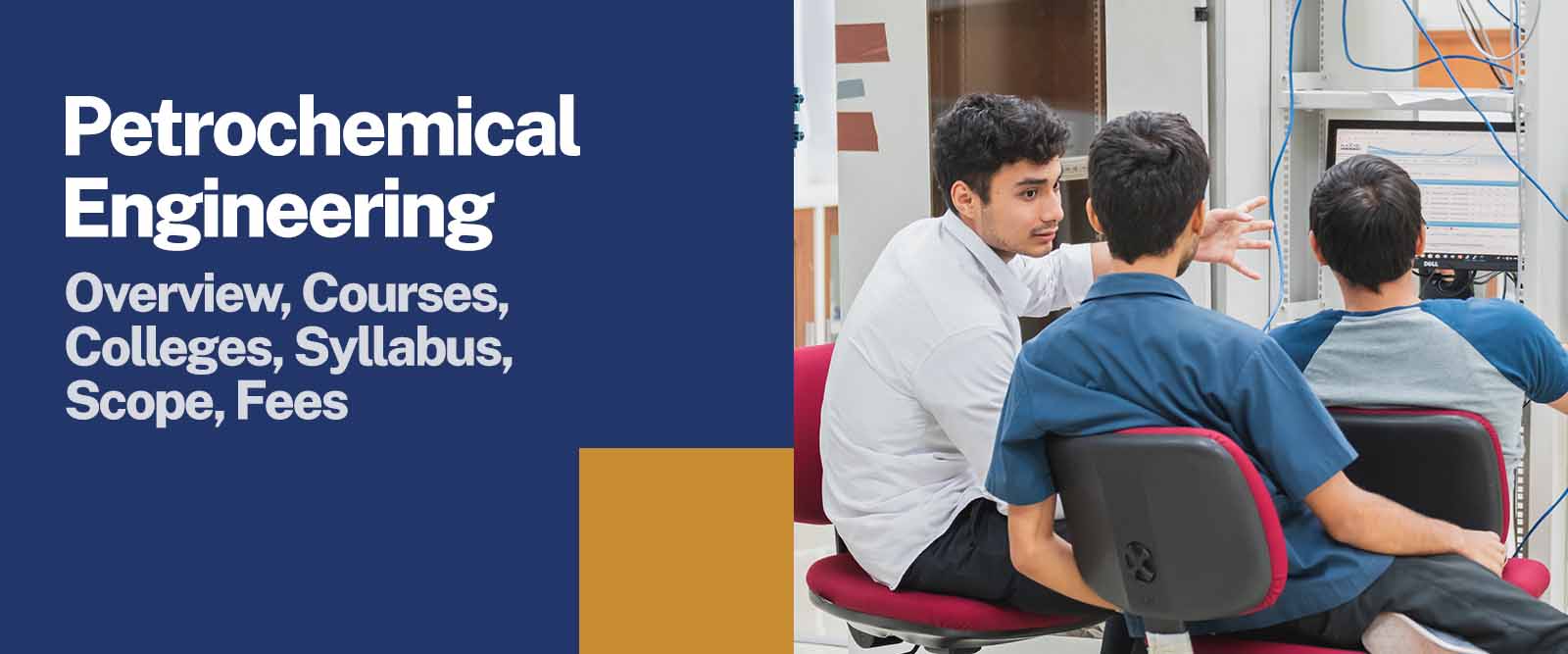5800 students unlocked their dream jobs with UG/PG programs in top colleges. Apply Now!
Petrochemical Engineering plays a vital role in maintaining the global economy, and it’s hard to imagine a world without petroleum. This article will tell you everything you need to know about getting a B.Tech degree in Petrochemical Engineering. We will talk about the top B.Tech courses in Petrochemical Engineering in the country, colleges that offer a Petrochemical Engineering degree in India, and much more.
What is Petrochemical Engineering? - An Overview
Petrochemical Engineering is an engineering field dedicated to extracting petrochemicals like oil and gas from the earth's surface. Being a non-renewable source of energy, the supply of petrochemicals is limited. Therefore, it becomes necessary to maximise the extraction process's efficiency, which is where Petrochemical engineers come into play.
A Petrochemical Engineer handles several responsibilities, including developing the equipment for drilling purposes. Petrochemical engineers are also responsible for locating the ideal site for drilling and installation/maintenance of the equipment on the oil rigs.
Petrochemical Engineering: Eligibility Criteria
The eligibility criteria for getting admission into Petrochemical Engineering, B.Tech courses in India are quite similar to other engineering courses in the country. Eligibility criteria depend mainly on whether you want to join an undergraduate or postgraduate course. Let’s discuss them individually.
Undergraduate Courses
- Students must pass their 10+2 examinations from a recognised examination board.
- Must score at least 50% of the total aggregate marks.
- Students must have Chemistry, Mathematics, and Physics as their subjects in their 10+2 examinations.
- Any specific eligibility criteria mentioned by your university of choice.
Postgraduate Courses
- Candidates must have a Bachelor’s degree or B.Tech in Petrochemical Engineering or related courses.
- Candidates must score at least 50% marks during their B.Tech degree.
- Any specific eligibility criteria mentioned by your university of choice.
Top Universities Providing B.Tech Degrees in Petrochemical Engineering in India
Petrochemical Engineering is an extension of the Chemical Engineering branch, as the two streams share a lot of similarities. Hence, a university that teaches or offers a B.Tech course or M.Tech degree in Chemical engineering might also provide a degree in Petrochemical engineering. Some of the top institutions in the country that offer a degree in Petrochemical Engineering are-
- IIT Madras
IIT Madras is one of the best engineering institutions in the country. IIT Madras is well known for its superior academics and placements. They are one of the best institutions in the country offering UG and PG courses in Petrochemical engineering. You must attempt the JEE Mains and Advanced examinations to grab a seat at IIT Madras. The total fee for a B.Tech program at IIT Madras is about ₹8.5 lakh rupees. IIT Madras takes applicants through JEE Advanced examination.
- IIT Bombay
IIT Bombay is ranked India's number one engineering institution. They boast a stellar campus with excellent academics and placement records. You need to get a top rank in JEE Advanced if you want to pursue a B.Tech degree from IIT Bombay. Just like other IITs, IIT Bombay takes admission to its UG programs through JEE Advanced.
- Rajiv Gandhi Institute of Petroleum Technology
RGIPT is dedicated to studying Petrochemical engineering and other STEM courses. The main campus of the university is located in Amethi, Uttar Pradesh. In contrast, new campuses are also being built in Assam and Bangalore. For a four-year B.Tech course at this institute, you will have to pay about ₹10 lakhs for academics. For admission, the candidates must clear the JEE Advanced.
Petrochemical Engineering Entrance Examinations
If you want to do a B.Tech degree in Petrochemical Engineering at one of the top institutions in the country. In that case, you first have to appear in an entrance examination. Some of the most common entrance examinations are-
- JEE Mains: JEE Mains stands for Joint Entrance Examination Mains, the primary examination for admission to various institutions across the country. You need to take the JEE Mains examination to be eligible for admission to IIITs, NITs, and other premium institutions in the country.
- JEE Advance: JEE Advance is the primary examination you need to attempt to get admission into IITs, the most premium engineering institution in the country. Students who have qualified for the JEE Mains examination are eligible to appear in the JEE Advance examinations.
- BITSAT: The Birla Institute of Technology conducts the BITSAT examination for admitting students into their engineering institutions in Pilani, Hyderabad, and Goa. Some of the other examinations you can attempt are WBJEE, UPSEE, VITEEE, and more.
Petrochemical Engineering B.Tech Degree: Syllabus
Taking admission into a college is the first step you need to take toward becoming a Petrochemical Engineer. Once you are admitted, you will start studying what Petrochemical Engineering is all about. Although the syllabus might vary from college to college, some of the common subjects that are taught in Petrochemical courses across the country are:
1st Year Syllabus
|
Semester 1 |
Semester 2 |
|
Introduction to Computing |
Introduction to Data Structures and Algorithm |
|
Physics |
Chemistry |
|
Engineering Mechanics |
Engineering Thermodynamics |
|
Mathematics I |
Mathematics II |
|
Basic Electrical Engineering |
Basic Electronics Engineering |
|
Engineering Drawing |
Workshop Lab |
|
Physics Lab |
Chemistry Lab |
|
Humanities and Social Sciences - Business Communication I |
Humanities and Social Sciences (HSS) - Business Communication II |
2nd Year Syllabus
|
Semester 3 |
Semester 4 |
|
Methods of Applied Mathematics I |
Numerical and Statistical Methods |
|
Geology for Petroleum Engineers |
Petroleum Production Operations I |
|
Humanities and Social Science (HSS) elective |
Surveying Theory |
|
Mechanical Engineering I |
Mechanical Engineering II |
|
Drilling Technology |
Managerial Economics |
|
Drilling Fluids and Cement |
Elements of reservoir Engineering |
|
Petroleum Engineering Practical I |
Petroleum Engineering Practical II |
|
Geology for Petroleum Engineers Practical Lab |
Surveying Practical Lab |
3rd Year Syllabus
|
Semester 5 |
Semester 6 |
|
Sedimentary and Petroleum Geology Practical |
Composite Viva Voce |
|
Petroleum Production Operations II |
Petroleum Formation Evaluation |
|
Sedimentary and Petroleum Geology |
Advanced Numerical Methods |
|
Applied Petroleum Resource Engineering and Management |
Directional Drilling |
|
Petroleum Engineering Practical III |
Petroleum Engineering Practical IV |
|
Methods of Applied Mathematics II |
Applied Electrical Engineering |
|
Project and Term Paper |
Project and Term Paper |
4th Year Syllabus
|
Semester 7 |
Semester 8 |
|
Petroleum Engineering Projects |
Petroleum Engineering Projects and Seminars |
|
Offshore Drilling and Petroleum Production Practices |
Enhanced Oil Recovery Techniques |
|
Oil and Gas Well Testing |
Petroleum Engineering Design |
|
Health Safety and Environment in Petroleum Practices |
Reservoir Modelling and Simulation |
|
Well Performance and Intervention |
Advanced Offshore Engineering |
|
Industrial Engineering and Management |
Oil and Gas Marketing and Resource Management |
|
Health Safety and Environment |
Pipeline Engineering |
Note: If you want to learn new technology trends, you can register with Sunstone. It is one of the leading service providers in the higher education sector that offers students a bundle of skill enhancement courses. It also offers dedicated placement support after course completion.
How Much Does it Cost to Study Petrochemical Engineering?
|
Minimum Course Fee |
Maximum course fee |
|||
|
Private |
Government |
Private |
Government |
|
|
UG |
₹ 68,000 |
₹7000 |
₹24.5 lakhs |
₹10.05 lakhs |
|
PG |
₹68,500 |
₹9800 |
₹2.65 lakhs |
₹2.78 lakhs |
|
Doctoral |
₹100,000 |
Nil |
₹100,000 |
Nil |
|
Diploma |
₹12,400 |
Nil |
₹12,400 |
Nil |
Petrochemical Engineering: Salary
Getting a degree in Petrochemical engineering can get you into some of the highest-paying engineering jobs in the world. The average starting salary of a Petrochemical Engineer in India is about ₹3 to 4 LPA. However, as your experience in the field increases, your salary does as well. The salary of a Petrochemical engineer can reach about ₹10 LPA in a span of a few years. A senior Petrochemical Engineer might earn as much as ₹50 LPA.
Conclusion
Petrochemical engineering is one of the fastest-growing engineering fields in the country, with excellent career opportunities. If you want to learn more about how natural resources are extracted, it might be the ideal course.
FAQ - Petrochemical Engineering
Is Petrochemical Engineering Good?
Petrochemical engineering is a great career option, especially if you are passionate about natural resources and their extraction.
HELP
Take the first step towards your dream job.
ABOUT THE AUTHOR


